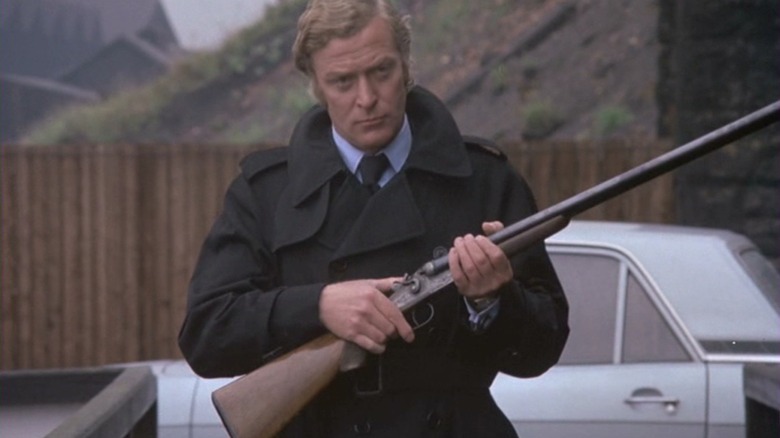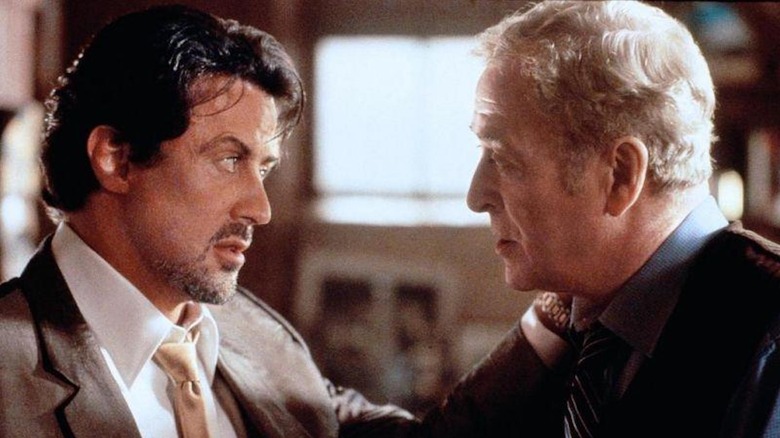Sylvester Stallone Thinks One Of His Flops Is A Prequel To Taylor Sheridan's Tulsa King
When we discuss Hollywood flops, it's important to stress that the term "flop" has nothing to do with the quality of the film. It's strictly about the movie's extreme financial failure. Francis Ford Coppola's "One from the Heart" was a massive flop, but, over 40 years later, it's now considered by many to be an artistic triumph (something to keep in mind as we move further away from the wipeout of 2024's "Megalopolis"). Brian De Palma's "Casualties of War" was a costly bomb for the legendary filmmaker, but the movie received rave reviews at the time and still stands as one of the greatest Vietnam War films ever made. And while Michael Lehmann's "Hudson Hawk" might've thrown a dent into Bruce Willis' commercial reputation, people with exquisite taste have come to recognize its anarchic genius.
When a non-franchise movie flops, my initial instinct is to find a way to stick up for it, even if it came up a little short artistically. The world is a better place for having fiascos like "Town & Country," "Cutthroat Island," and "Jupiter Ascending" in it. So, when I learned Sylvester Stallone recently called one of his underrated "gangster" flops a prequel to his role as Dwight Manfredi on the Taylor Sheridan-created Paramount+ series "Tulsa King," I got excited. It ain't a perfect movie by any stretch, but John Landis' "Oscar" has a nifty screwball spirit and loads of terrific performances from the likes of Tim Curry, Don Ameche, and Marisa Tomei. I didn't quite see the connection, but Stallone has been making all kinds of questionable associations lately; at least this one would shine a spotlight on a mostly forgotten movie.
Alas, he didn't mean "Oscar."
Remaking a 1970s British gangster classic proved perilous for Stallone
Another term that gets used too often as a condemnation is "remake." Whenever a proposed remake of any movie, hit or failure, is announced, people who like to bemoan Hollywood's lack of originality unsheathe their broadswords. How soon they forget that some of the greatest films of all time — e.g. Howard Hawks' "His Girl Friday," John Carpenter's "The Thing," and David Cronenberg's "The Fly" alike — are remakes. Granted, there is occasionally good reason for knee-jerk skepticism, if not outright vitriol, for some remakes. When accused sexual harasser (and known no-talent) Brett Ratner signed on to take a second crack at Thomas Harris' "Red Dragon," which had already been turned into a classic thriller by Michael Mann as "Manhunter," it was correct to assume a film completely devoid of value was en route.
As for when first-time feature director Stephen Kay teamed with Sylvester Stallone to redo Mike Hodges' British gangster classic "Get Carter," that was kind of tricky.
Straight away, we knew better than to expect a down-and-dirty revenge yarn on par with the original, which boasts a memorable scene where a shotgun-wielding, fully nude Michael Caine walks a would-be assailant into the street out in front of his flat. Hodges' movie was a knuckle-sandwich of gritty '70s crime cinema. A Hollywood remake was unlikely to go quite as hard (though a screenplay by "American History X" scribe David McKenna augured some promise).
There was also the matter of the film's production company. Owned by dry-cleaner-to-the-stars Elie Samaha, Franchise Pictures was notorious for bankrolling fading stars' vanity projects. When "Get Carter" was announced, the company was already a joke for having sunk loads of cash into John Travolta's Scientology dream project adaptation of L. Ron Hubbard's pulp sci-fi novel "Battlefield Earth" (a flop that is also an utter abomination). Samaha was enamored of Stallone and therefore likely to back him in any creative disputes. (Sly is an inveterate screenplay tinkerer, and not always for the better.)
So, how did it turn out, and in what way is it a prequel to "Tulsa King?"
Get Carter and Tulsa King share a little DNA
The best that can be said of Kay's "Get Carter" is that it's literally awash in atmosphere. Set in Seattle, Washington, you feel the rain and chill of the city in a way few films have captured. That's something. Also worth noting is Mickey Rourke's menacing portrayal of a sleazeball gangster who comes out on top in a brawl with Stallone.
Unfortunately, Kay decides to pay direct homage to the original by casting Michael Caine as a loan shark and having composer Tyler Bates mimic Roy Budd's idiosyncratic score. These elements only serve to remind the viewer they're not watching Hodges' film, and, as a result, hamstrings the new movie's efforts to distinguish itself. Worst of all, there's a happy ending that clashes with the tale's essential nihilism.
Budgeted at a reported $63.6 million, "Get Carter" flopped hard with a $19.4 million worldwide gross. The poor non-domestic showing was a huge blow to Stallone's rep for being bankable internationally. Though James Mangold's "Cop Land" had rekindled critics' interest in Sly's career three years earlier, they largely wrote the remake off as a pale, pointless imitation of a much better film.
Where does "Tulsa King" factor in here? According to Stallone on his Instagram:
"It's interesting that 25 years ago I was acting in one of my BEST films, the underrated 'Get Carter' and now that I look back at it, it looks like I was subconsciously preparing myself to play 'Dwight Manfredi' in 'Tulsa King' 25 years later! Let's just call it a prequel!"
The obvious similarity is that Carter and Manfredi are fishes out of water who shake up cities they do not know with their brutal, unrelenting manner of doing illicit business. But whereas Manfredi is looking to set down roots and build in Tulsa, Carter simply wants to get revenge for his brother's murder and skip town (even if it leaves him a marked man for the rest of his life). If you haven't seen Kay's "Get Carter," the best I can say is that it's no "Rhinestone" or "Stop! Or My Mom Will Shoot." You won't regret watching it, but I'm doubt it will deepen your appreciation for "Tulsa King."


